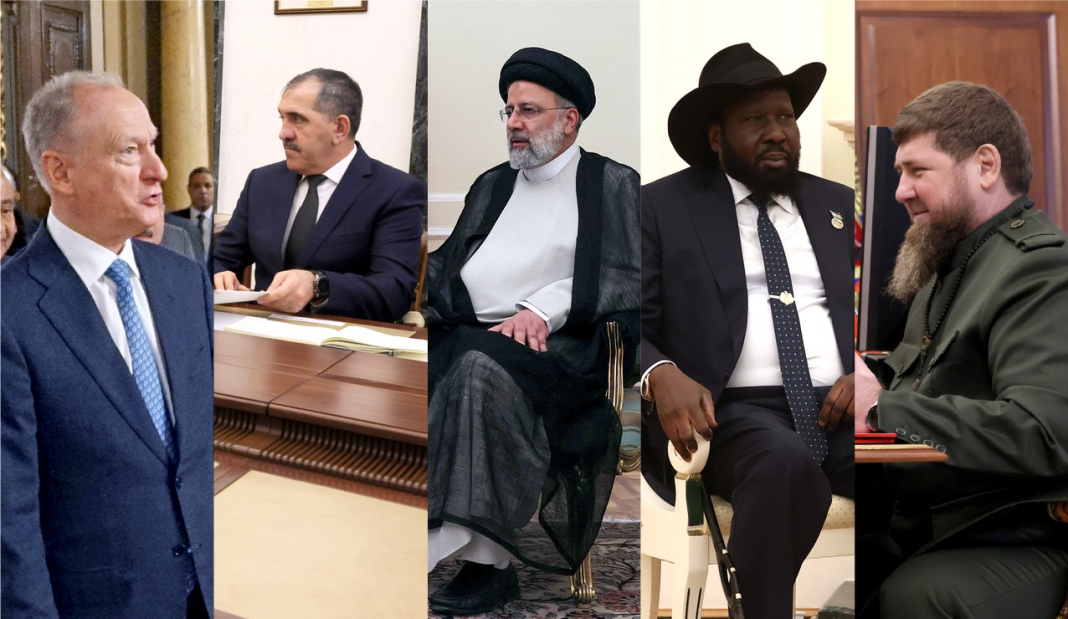This report describes the key events that significantly impacted Russia’s political, economic and social processes.
Based on the results of the past week, the following trends can be summarised:
- Russia continues to increase its influence at the regional level, trying to form new alliances and strengthen relations with neighbouring states. Negotiations with the President of Iran demonstrate the Kremlin’s active involvement in strengthening security in the Caspian region and in an attempt to stabilise the situation in the South Caucasus, involving all interested parties. An initiative on founding a military-political bloc may be announced soon; it will include Russia, North Korea, Iran, and Belarus, as well as several other Central Asian and the Middle East countries.
- The demonstrative appearance of Ramzan Kadyrov in public indicates that his position in Putin’s entourage is only strengthening. Also, in this way, the Kremlin demonstrates the fight against information leakage. Apparently, rumours about a severe deterioration in Kadyrov’s health were initiated to identify the sources of the leaks. In any case, it can be assumed that shortly, it will be possible to observe an increase in Kadyrov’s influence on several processes both in the Caucasus and in the temporarily occupied territories of Ukraine.
- Putin continues to strengthen Russia’s presence in Africa. In essence, Salva Kiir’s visit should be assessed as a continuation of the Kremlin’s “African” policy. The actions to re-establish hegemony on the African continent are fully coordinated with China, which is actively developing lands south of the equator and in the western part of China, in every possible way stimulating Russia to take action to displace the interests of the West in Africa (primarily France).
This digest highlights the following topics that were most relevant for Russia during 25th September – 1st October:
1. Telephone conversation between Vladimir Putin and Iranian President Ebrahim Raisi;
2. Meeting of Vladimir Putin with the head of Chechnya, Ramzan Kadyrov;
3. Meeting of Vladimir Putin with the President of South Sudan, Salva Kiir;
4. Meeting of Vladimir Putin with Yunus-Bek Yevkurov and Andrei Troshev;
5. Visit of Nikolai Patrushev to Oman and Egypt;
6. Article by Sergei Karaganov;
7. Article by Vladislav Surkov;
8. Article by Dmitry Medvedev.
This Content Is Only For Subscribers
- Telephone conversation between Vladimir Putin and Iranian President Ebrahim Raisi
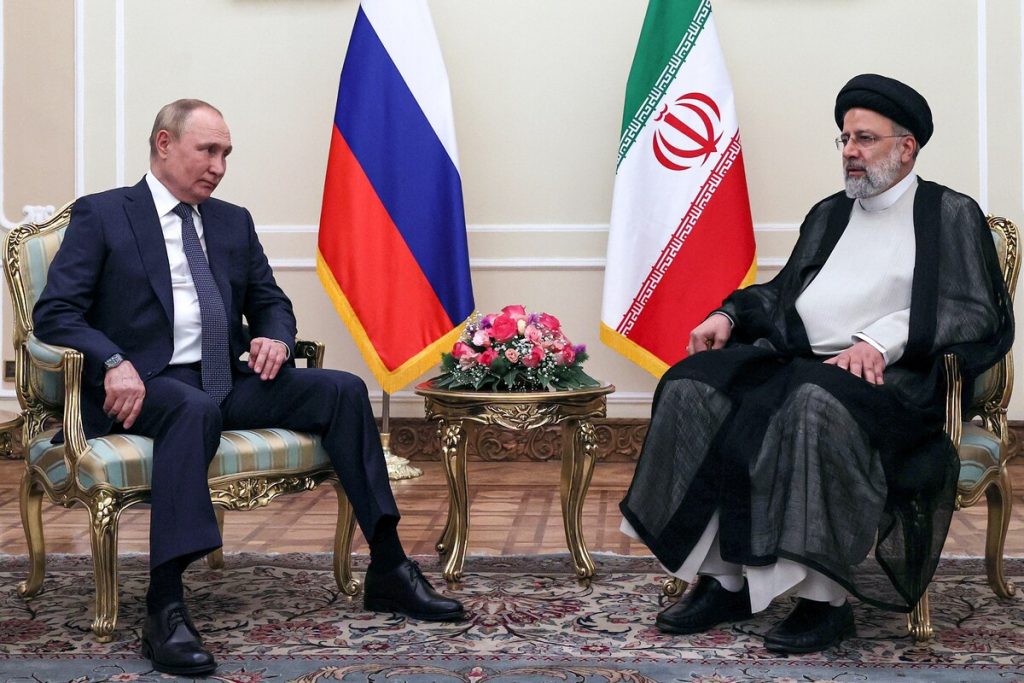
On Tuesday, September 26, Vladimir Putin spoke with the President of the Islamic Republic of Iran, Ebrahim Raisi. According to official statements, during the conversation, the parties discussed the results of the BRICS summit and Iran’s further participation in this organisation in full format. The situation around Nagorno-Karabakh and further normalisation in the region were also discussed. The parties also expressed interest in intensifying the “3+3” consultative regional platform (Azerbaijan, Armenia, Georgia plus Russia, Iran and Turkey). It is noted that the telephone conversation took place at the initiative of the Iranian side.
Outcomes and outlook:
Putin’s conversation with Raisi is a rational continuation of the rapprochement between Russia and Iran, which has been observed over recent years. It is important to emphasise that the current conversation took place against the backdrop of several important events – the completed visit of Sergei Shoigu to Tehran, information about possible military-technical cooperation between Iran and Russia, as well as events in the South Caucasus, as a result of which the positions of Turkiye and Azerbaijan strengthened (Iran in the conflict around Karabakh he supported more the Armenian side). During the conversation with the President of Iran, Putin’s main goal was to try to calm the Iranian leadership and explain the position of Russia, which, in essence, “surrendered” Armenia.
It is important to note that despite the widespread opinion that Moscow and Tehran want to strengthen relations between the two states as much as possible, Iran understands the serious risks of such a rapprochement. Moreover, Iran considers the factors of Azerbaijan, Turkiye and Israel, which, in many issues, are opponents or even pose an open threat to Tehran. With this approach, the rapprochement between Iran and Russia looks more like a forced step.
It is noteworthy that the next day after the telephone conversation between Putin and Raisi, Turkish leader Recep Erdogan said that Tehran supports the initiative to create a transport corridor between Azerbaijan and its exclave Nakhichevan, which could pass through Iranian territory. In fact, we are talking about several important aspects at once:
- Iran is trying to take over the initiative from Russia, which controls the Zangezur corridor with the help of FSB forces.
- Iran shows interest in maintaining relations and a common border with Armenia.
- Iran is trying to play a more important role at the regional level, extending its influence to processes in Turkiye, Armenia, Azerbaijan and Russia.
Another significant aspect that could have been discussed during the telephone conversation between Putin and Raisi concerns the prospects for creating a military-political bloc, which could theoretically unite several regional leaders (Russia, Iran, North Korea, Belarus, Kazakhstan, as well as attract other states-members of the CSTO). Several unofficial sources have recently repeatedly stated the possibility of creating such a block. However, one must understand that such a process is extremely complex and faces several both internal and external contradictions and ambitions.
Also, one should not exclude the possibility that another joint military exercise between Russia and Iran will be announced soon. Strengthening cooperation in this area demonstrates the desire of the two states to enhance their influence in the Caspian region and develop it at the regional level in Central Asia and the Middle East. Moreover, suppose the internal political situation in Iran becomes more complicated (due to the deterioration of Ayatollah Khameni’s health or several social and economic processes). In that case, Russia can provide its PMCs to stabilise the situation inside Iran. Iran already expressed a similar request during a wave of protests in December 2022.
- Meeting of Vladimir Putin with the head of Chechnya, Ramzan Kadyrov
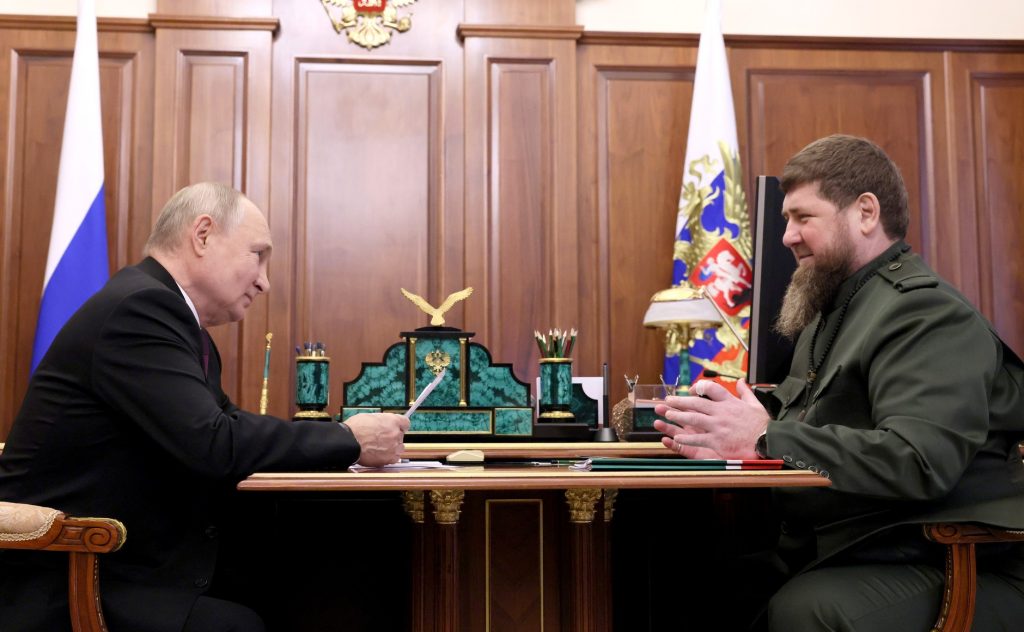
On Thursday, September 28, a working meeting occurred between Vladimir Putin and the head of the Chechen Republic, Ramzan Kadyrov. According to Putin’s statement, the main topic of the meeting was a discussion of the economic and social situation in the Chechen Republic. During the public part of the meeting, Putin and Kadyrov discussed the situation around the so-called “SMO” (Russian aggression against Ukraine). Kadyrov boasted about the “achievements” of the group under his control and announced its profound achievements.
Key theses:
- Putin: “Generally speaking, the dynamics are positive. This is largely thanks to you and your team, as people work confidently and have good interaction with the Russian Federal Government. We have several serious tasks and programs that you yourself talk about all the time.”
- Kadyrov: “They even wanted to brag about both the humanitarian and military aspects. Your squad shows good results: every day, they take prisoners, and every day, they destroy equipment. No Abrams tanks are afraid of us. I believe that we were doing “advertising” for them.”
- Kadyrov: “The whole people support you. We are the only region… I can tell you that five regiments and three battalions were created during this time in the republic, and today, they are all engaged in the [so-called] “SMO.”
- Putin: “I think I already said: I asked one how the guys from Chechnya are fighting there. The answer was at that very second: they won’t let you down; I have complete confidence in them. You see, this still says a lot. This is an assessment of commanders who take part in combat operations.”
- Kadyrov: “Vladimir Vladimirovich, if we don’t carry out your order, we won’t live in this state. We will carry out your order 100 per cent.”
- Kadyrov: “We don’t have any special problems in the republic – we solved these problems long ago. As always, there are technical issues on which we need your help.”
Outcomes and outlook:
The main purpose of this meeting is to deny rumours about Kadyrov’s death or serious condition and emphasise that Kadyrov continues to be in Putin’s favour. In essence, Kadyrov receives a new carte blanche and strengthens his position in the North Caucasus, turning Chechnya into a kind of analogue of Eastern despotism in exchange for loyalty to the overlord.
Also, after this meeting, it became clear that the incident with the beating of activist Zhuravel, who burned the Koran in a pre-trial detention centre by Kadyrov’s son, would not be investigated or have consequences.
Notably, the meeting between Putin and Kadyrov was concise. This can be understood from the rather busy schedule of the Russian President on this day, as well as the time of publication of reports on meetings on the official Kremlin website. At the same time, this may indicate that the negotiation processes themselves in the North Caucasus took place earlier, and the meeting was only the completion of this process.
- Meeting of Vladimir Putin with the President of South Sudan, Salva Kiir
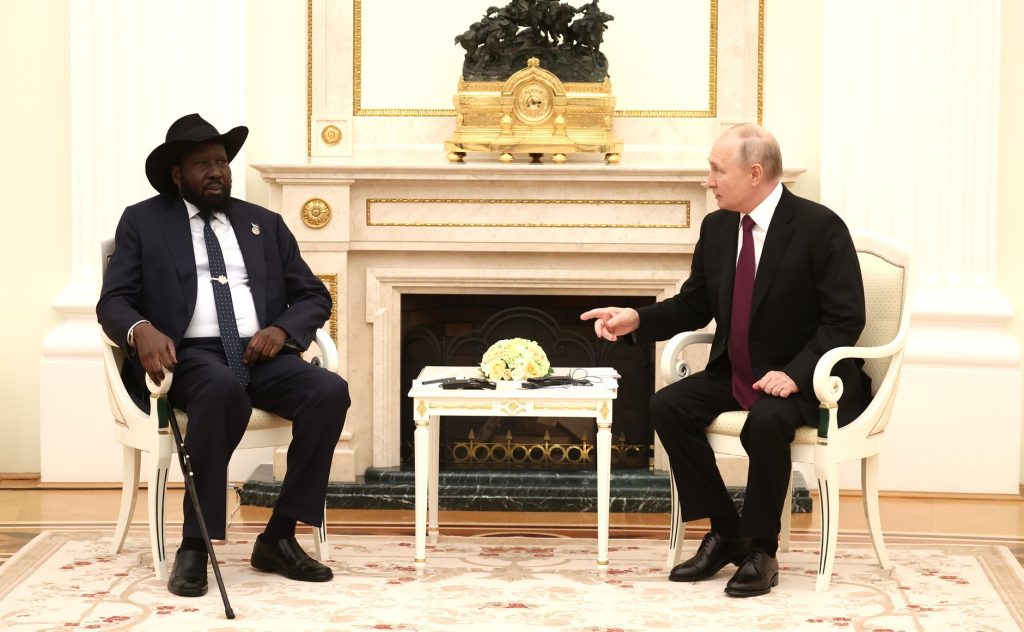
On Thursday, September 28, Vladimir Putin met in the Kremlin with the President of the Republic of South Sudan, Salva Kiir, who visited Russia on an official visit. During the meeting, the parties discussed further strengthening economic and political relations between the two states. Also, the Russian Minister of Economic Development Maxim Reshetnikov, Russian Presidential assistant Yuri Ushakov and Russian Foreign Minister Sergei Lavrov joined the negotiations.
Key theses:
- Putin: “Relations between our countries are developing very intensively. We were one of the first countries to recognise the sovereignty and independence of South Sudan. I must say that we believe that much remains to be done, primarily in economic development.”
- Putin: “We have many good opportunities in various areas, including energy. I hope that the developments that exist, I mean the construction of a refinery in your country with the participation of our company and plans to create the second stage of this plant, will benefit the development of our trade and economic ties.”
- Putin: “Of course, we are aware that further progressive development is connected with ensuring security, with the settlement of all those problems and difficulties that you have inherited from previous times, so we will do everything to support you and this direction.”
- Kiir: “I am here today as the first step in a long journey of our working together in the future. We will work together with the Russian Federation, so I came.”
- Kiir: “We will work together – with you and with the Russian Federation, because today, the situation in the world shows that no one can survive or succeed alone, and our country is no exception.”
- Kiir: “We are the youngest nation on the planet. We need to have strong, influential friends, one of which is you. We do not see any alternatives to friendship with you.”
Outcomes and outlook:
Putin continues to strengthen Russian presence in Africa. Kiir’s visit should be assessed as a continuation of the Kremlin’s “African” policy. It is obvious that the actions to re-establish hegemony on the African continent are fully coordinated with China, which is actively developing lands south of the equator and in the western part of China, in every possible way stimulating Russia to take action to displace the interests of the West in Africa (primarily France).
In 2011, the very emergence of the state of South Sudan was a kind of challenge to the interests of the West in Africa. This challenge is intensifying, provoking instability and a clash of interests of major players. The mention of “energy programs” prompts the idea that Russia can play its favourite game in South Sudan – building a nuclear power plant in order to consolidate its interests in the region and draw neighbouring states into dependence – and South Sudan borders critical for Russian strategy in Africa by Sudan, Kenya, Ethiopia, Central African Republic, Democratic Republic of Congo and Uganda.
We may soon see Russian PMCs in South Sudan – also Putin’s favourite move. Moreover, during the meeting, the Russian president hinted that the further development of relations between the two states is closely related to security issues.
- Meeting of Vladimir Putin with Yunus-Bek Yevkurov and Andrei Troshev
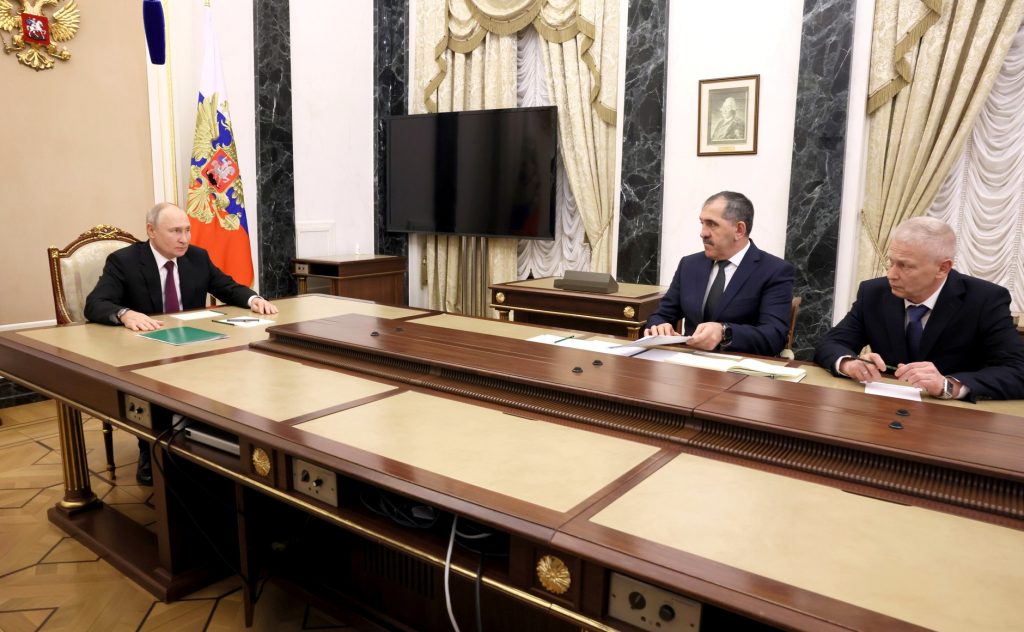
On Thursday, September 28, Vladimir Putin met with Deputy Minister of Defense Yunus-Bek Yevkurov and Andrei Troshev. They discussed issues of forming volunteer units and the situation in the combat zone in the temporarily occupied territories of Ukraine. The meeting itself was held behind closed doors. Nevertheless, during his opening remarks, Putin made it clear that the issues planned for discussion were strategic.
Outcomes and outlook:
Yunus-Bek Evkurov is strengthening his position in the Ministry of Defense: he oversees the activities of volunteer formations and PMCs. He actively negotiates with African and Asian countries regarding the “sale” of PMCs to hot spots.
He has now occupied the niche previously occupied by Yevgeny Prigozhin. That is why Putin’s meeting with Yevkurov and Troshev (former chief of staff of the Wagner PMC) most likely concerned the issue of developing PMCs and coordinating their actions – both in the Ukrainian direction and in Africa. It is no coincidence that the next day after the meeting with Putin, “Wagnerites” again began to be transferred to Bakhmut.
- Visit of Nikolai Patrushev to Oman and Egypt
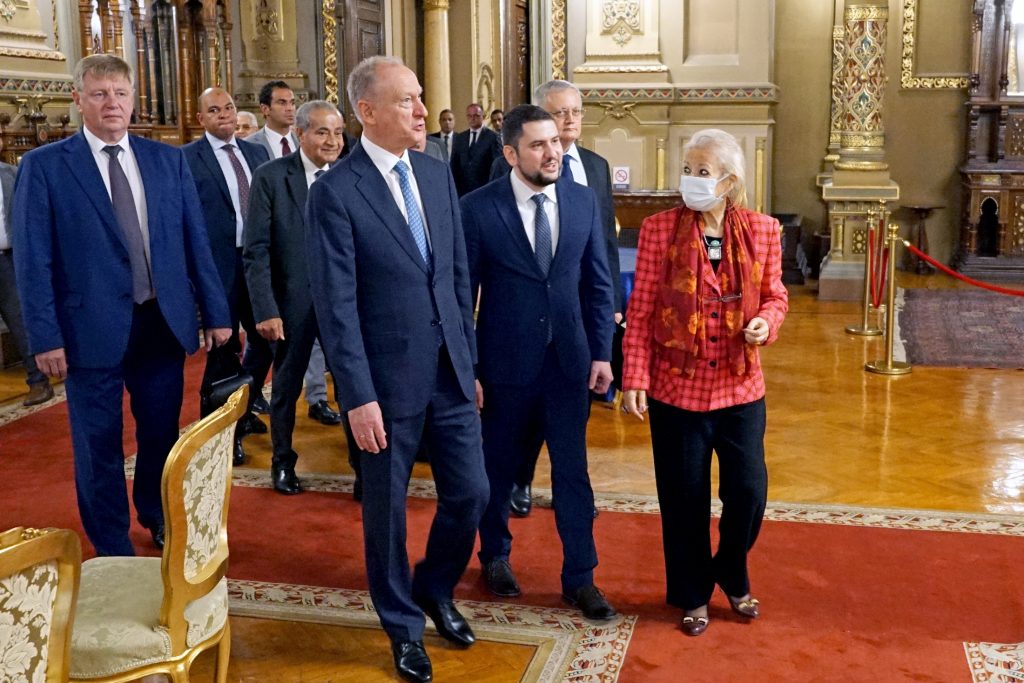
On Monday, September 25, Secretary of the Security Council of the Russian Federation Nikolai Patrushev paid a working visit to Oman. In Muscat, he held negotiations with the head of the Sultan’s Office, Sultan Mohammed An-Naamani. Patrushev also met with the Secretary General of the National Security Council of Oman, Idris Al Kindi. According to official statements of the parties, during the visit, issues of Russian-Omani bilateral relations, cooperation in the field of information security, interaction between law enforcement agencies, intelligence services and financial intelligence were discussed. Also present at the meeting were representatives of the Russian Foreign Ministry, Ministry of Internal Affairs, FSB, SVR and Rosfinmonitoring.
The very next day, the Russian delegation went to Egypt, where negotiations took place with the Adviser to the President of Egypt on national security issues, Faiza El-Naga, and the Adviser to the head of the republic on counter-terrorism issues, Magdi Abdelgaffar. It is noted that during the visit, the parties discussed security issues in the Middle East, North Africa, Mediterranean and the Sahara-Sahel zone. The Ukrainian issue was also raised. Also, the parties discussed financial security issues and further development of cooperation in this direction.
On Wednesday, September 27, Nikolai Patrushev met with Egyptian President Abdelfattah Sisi, during which issues of interaction between the two states in the field of economic security were also raised. The parties also discussed Egypt’s further participation in BRICS.
Outcomes and outlook:
Patrushev continues to be the leading curator of the “eastern” direction. His visits are usually preliminary. Given that Oman has not signed the Rome Statute, and Egypt has not ratified this document, it is quite possible to expect the announcement of visits to these states by Vladimir Putin shortly (after he visits China, Putin intends to make several more trips to show that he can make foreign visits despite a warrant from the International Criminal Court). This is a significant detail for Putin on the eve of the presidential elections.
Also, in addition to foreign policy issues, Patrushev is simultaneously dealing with economic aspects that fall within the area of responsibility of his family members. For example, five days before Patrushev visited Egypt, Bloomberg stated that Egypt refused Russian wheat in favour of 1 million tons of grain from France and Bulgaria due to disagreement with the price that Moscow was trying to set. Such an incident became a very noticeable blow for Patrushev Jr., the Minister of Agriculture of the Russian Federation. However, immediately after the end of Patrushev’s negotiations with the President of Egypt, the same Bloomberg reported that “Egypt is negotiating the purchase of 1 million tons of Russian wheat as part of an intergovernmental deal.”
- Article by Sergei Karaganov
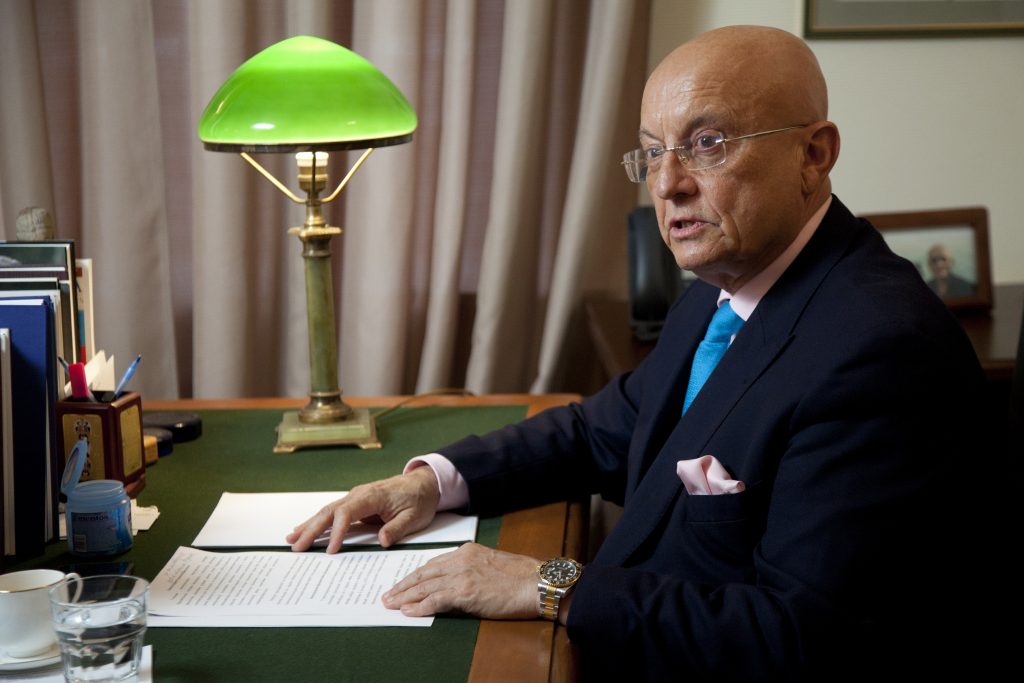
On Tuesday, September 26, the journal “Russia in Global Affairs” website published an article by Russian political scientist Sergei Karaganov “How to prevent a third world war.” Once again, the author argues for the need for Russia to use nuclear weapons, which should supposedly contribute to the establishment of peace and the resumption of diplomacy. Karaganov also notes that one of the intermediate goals of his reasoning about using nuclear weapons is to restore the understanding that a significant part of the planet has existed in a state of peace for too long.
Key theses:
- “Active nuclear deterrence, which I propose to resort to, is aimed specifically at preventing a global thermonuclear conflict, and better yet, any use of nuclear weapons.”
- “I also know very well the theory that nuclear weapons, if used, will inevitably lead to escalation to the global level and the destruction of human civilisation. This possibility exists, and it should not be underestimated in any case. But without strengthening nuclear deterrence and restoring the fear of nuclear war, including the credible threat of limited use of nuclear weapons, a global war is practically inevitable, given the trajectory of the world’s development.”
- “Downplaying the threat of nuclear war to justify reckless policies and impose defeat on Russia reaches the point of absurdity. Secretary of State Antony Blinken, fourth in line to succeed the US president in the event of his death or inability to perform his functions, said that “the potential threat of nuclear war is no worse than the existential problem of climate change, and there is no hierarchy between them.”
- “By hushing up the nuclear threat, the American “deep state” is currently providing itself with indulgence to pursue an aggressive and simply reckless foreign policy.”
- “It is necessary to return to our adversaries and partners the understanding of our determination to “respond to the fullest” in the event of a continuation and escalation of his aggressive actions. (Despite the organisation of the DPRK, not a single drone hit Pyongyang since its opponents are confident in its determination to the most severe – not necessarily even nuclear – response).”
- “It is also clear that it is impossible to finish the [so-called] “SMO quickly”, and, probably, it is not necessary. Time is needed to complete the process of the final nationalisation of the elite, the expulsion from it and from the minds of those who remain of Western-centrism and Westernism, the compradors and their characteristic way of thinking, the restructuring of the economy and the country for successful development in the conditions of the growing geopolitical and geo-economic earthquake over the next decade or two.”
- “A race to the bottom in the hope that the West, given its deep multi-level crisis, relatively more vulnerable, and still relatively democratic political system, will be the first to falter – an unreliable strategy.”
- “The crisis around Ukraine is one of the symptoms of a much more dangerous disease of the world system. For many years, I wrote about the growing threat of the Third and, apparently, the last world war for human civilisation. The threat is still growing even without the Ukrainian crisis, which has aggravated and brought it closer. Still, if we complete it victoriously, it can also push it back and even eliminate it.”
- “A pre-war situation is quickly being created in moral and psychological terms. We don’t see regular people. Or we see those deceived. And they definitely don’t see us as normal.”
- “I don’t see any other way to prevent a global war, and before that, the exhaustingly costly [so-called] “military operation” in Ukraine, except through increased reliance on nuclear deterrence-deterrence-sobering, and, probably, not only with the threat of retaliation against the territories of US allies but also, if necessary, at American bases (we have almost no bases abroad). “Washington hawks and the public must know that retribution for their recklessly aggressive policies is inevitable.”
- “And for this it is necessary, firstly, a speedy lowering in our doctrine of the carelessly, if not recklessly raised threshold for the use of nuclear weapons and, secondly, a careful but decisive movement up the ladder of escalation-deterrence-deterrence, while convincing and themselves, and the enemy, in readiness, if it does not work and the West does not retreat and reconsider its policy, for the group use of nuclear weapons against several European countries that are most aggressively involved in supporting the “Kyiv junta.”
Outcomes and outlook:
The fact that Russia simultaneously launched articles by the “hawks”, namely Karaganov and Medvedev, featuring new horror stories regarding the nuclear threat and the Third World War is indicative. Obviously, the secret negotiations conducted between Russia and the West (with varying success and varying intensity) have again reached a dead end. This is the Kremlin’s favourite move: if diplomacy is at a dead end, bringing in Medvedev and Karaganov, who should stimulate the West to greater compliance, is necessary.
At the same time, it is important to note that, in contrast to Medvedev’s harsh statements, Karaganov, in his articles, focuses on a completely different audience (primarily the scientific community and think tanks), which can have a more serious influence on political decision-making in other states. First of all, we can talk about European countries. In fact, the main goal of Karaganov’s upcoming article is to convince European scientific circles that Russia is not joking and that 25 years of peaceful, carefree life on the European continent are coming to an end.
- Article by Vladislav Surkov
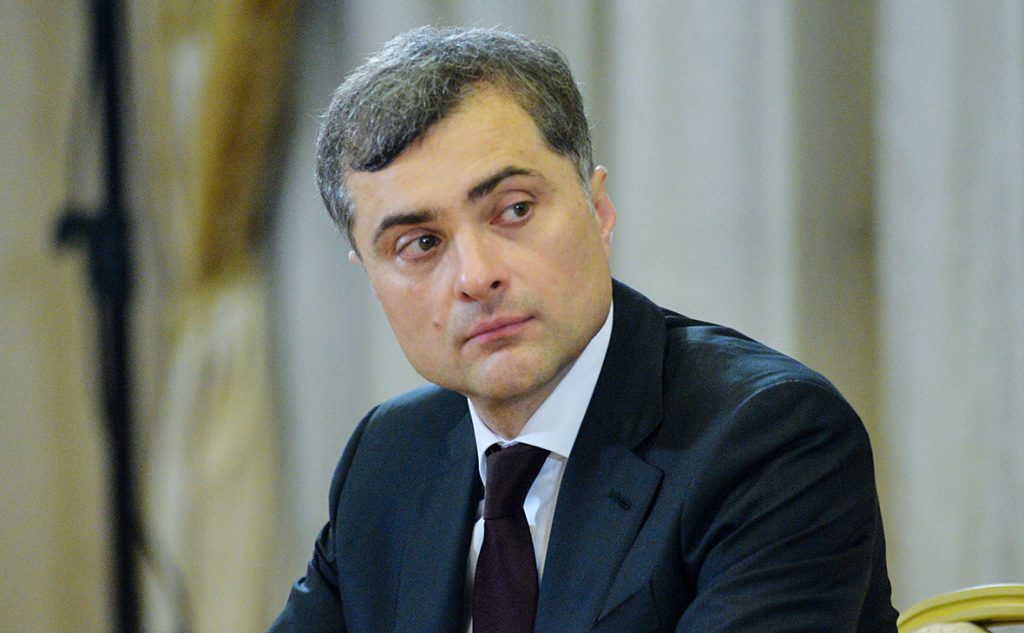
On Wednesday, September 27, the “Actual Comments” website published a new article by Putin’s former aide, Vladislav Surkov, entitled “The Birth of the North.” In it, the Author puts forward a geopolitical theory according to which, in the future, a single allied space may be formed between Russia, Europe and the United States, which will confront the Global South. In general, the article does not carry any particular meaning. Yet, its primary resonance is caused by the very authorship of Surkov, who, although he has no real influence on current political processes, is still trying to persistently demonstrate that it is too early to write him off the domestic political chessboard.
Key theses:
- “What can you discern ahead if you try to look beyond the mirages? What happens if you remove false pieces from the chessboard? There will be a Great North – Russia, the USA and Europe, forming a common socio-cultural space. Triune northern geopolitical cluster. The North’s premonition is already evident in the increased use of the term “global South.” But there is no south without a north.”
- “It is now difficult to believe that conflicting systems will eventually achieve a high level of convergence. But it was just as difficult to believe in a united Russia when Mikhail Tverskoy fought with the Principality of Moscow. It was just as difficult to believe in a united Europe during the time of Wallenstein. Or in the union of the states of America – at the beginning of the war between the Yankees and the Confederates.”
- “Yes, not soon. Yes – “not on our shift.” The chance to create a large northern alliance was missed at the beginning of the 2000s when our President invited the Americans to consider Russia joining NATO. The offer was rejected. Most likely, out of fear that within the new security contour, Moscow will be able to challenge Washington’s hegemony and seize leverage over the “junior” members of the alliance.”
- “The three largest northern civilisations, Russian, European and American, draw inspiration in their political development from the Pax Romana. The word of Elder Philotheus still latently guides Russia. The European Union proclaimed Charlemagne the “Emperor of the Romans,” its forefather. Washington’s most famous hill is named after the legendary Capitol. The source code of these three metacultures is found in the Iliad and the Gospel. Their relationship is obvious.”
Outcomes and outlook:
Vladislav Surkov has long ceased to be influential in Russian politics. Still, he attracts attention by inertia. However, this article is not only an attempt to remind ourselves again and return to politics.
Previously, Surkov wrote articles that either anticipated or developed Putin’s ideological constructs. Now, Surkov runs counter to Putin’s ideology. Surkov makes a message to the West – he offers an alternative version of the union (the “Global North” versus the “Global South”). He supposedly sends a signal: not everyone in Russia shares Putin’s policy aimed at a close alliance with China.
This is primarily a signal to the West: are you looking for someone to rely on in Russia? We are here! It is no coincidence that so much attention is paid to King Manuel and Vasco da Gama, who sought the Kingdom of Prester John in vain. The main message is that the West did not find the Kingdom of “Pop Ivan”, not because it did not exist, but because they were looking in the wrong place.
- Article by Dmitry Medvedev
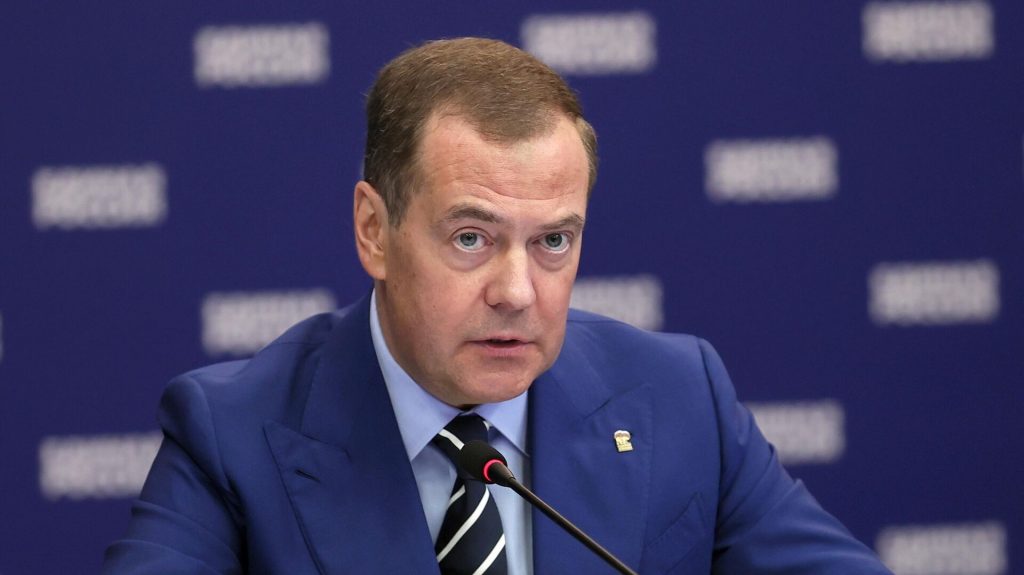
On Monday, September 25, an article by Deputy Chairman of the Security Council of the Russian Federation Dmitry Medvedev was published. The article appeared on the department’s website and has no title. In it, Medvedev parallels the Russian-Georgian conflict and Russian aggression against Ukraine. At the same time, despite maintaining his extremely radical manner of speaking about the West, in this article, Medvedev entirely moves away from the topic of the use of nuclear weapons. Regardless, he boils it all down to the fact that the West, represented by the United States, is supposedly doomed to defeat.
Key theses:
- “It seems that for the United States and its henchmen, the territory of the former Union is a “land of unlearned lessons.” Which should have been learned long ago. Like schoolchildren, using a red pen in a notebook, highlight the most stupid and shameful mistakes and not repeat them. After all, millions of people continue to pay an incredibly high price for these monstrous failures.”
- “There’s only one problem. There are no guarantees that the West will not once again hold a competition for the most worthless, controlled and incompetent politician to make him its new puppet somewhere near the Russian borders. He won’t pump him up with money, won’t incite him under the guise of advice, won’t supply him with weapons, mercenaries, instructors and everything else. It will not inspire imperial ambitions in a nonentity and a half-educated person. And a programmed doll will not unleash another “regional conflict.” Under the same slogans as Georgia 15 years ago.”
- “At one time, Saakashvili became the first proxy leader of the United States in the Caucasus with the only mission – to incite hatred of Georgians towards Russia, undermine its position in the Transcaucasus, and darken the centuries-old friendship of the two peoples. This strange creature was bringing war closer with all its might. He pretended to be the “Old Testament shepherd David” – and at the same time, did everything to make the Georgians forget their common history, break ties with Russia, hate their closest neighbours – Russians, Ossetians, Abkhazians – and wish them death.”
- “How everything will end and where the pendulum will swing is obvious. Sooner or later, the Ukrainians, who have long been tired of letting themselves and their children become “cannon fodder,” will simply throw off the current junta, like the Georgians do their shitty pseudo-Führer. And they will choose normal, adequate leaders. For whom Russia is a friendly neighbour or, more accurately, simply a common home. Not prone to hysterical dependence on the West. This has already happened in many countries in different historical eras and will happen here, too. It would be better, of course, if this happened as soon as possible.”
- “Verbally supporting the Minsk agreements, NATO countries cynically used the negotiation process to play out time and pump Kyiv with weapons, preparing for full-scale aggression. Everything was done to create an illusion in the weak-minded but militant Ukraine: very soon, it will be accepted into the European Union, NATO, and anywhere else. They will arm you to the teeth and shower you with manna from heaven. And then – according to the principle, “they beat our people!” “They will come out with all their North Atlantic might against Russia.”
- “Now the West is drowning in its hypocrisy. He rushes and flounders, swallowing his sticky lies. Some statements contradict others. America is rushing to the presidential elections and is already split over the issue of Ukraine. And the weak-willed European minions got completely confused in the argumentation, handing over their economy to the Americans and making one mistake after another.”
- “We do not need a repeat of 2008. We remain ready to solve problems at the negotiating table in the spirit of the UN Charter. But if our concerns become real, we will not hesitate. The idea of joining Russia is still popular in Abkhazia and South Ossetia. And it may well be implemented if there are compelling reasons for this.”
Outcomes and outlook:
Dmitry Medvedev continues to play the leader of the “war party” surrounded by Putin. His article is a compilation of theses that have been repeatedly voiced and contain no new messages. Medvedev’s task is to create a background against which Putin will seem “not such a terrible evil” in the eyes of the West.
Medvedev’s public appearances are a “play of Zhirinovsky.” Still, at the same time, Medvedev, who by his status is de facto “vice president,” has every chance to lead the Russian Federation again in case Vladimir Putin leaves the presidency. And this prospect should especially frighten the West, according to the initiators of this political game.
In general, it can be noted that the active production of such publications and statements, which has been stated recently, indicates the situation’s impasse and the Kremlin’s lack of options or opportunities to get out of it. However, in this matter, the main risk is the escalation of the conflict, which may become Russia’s only response.

